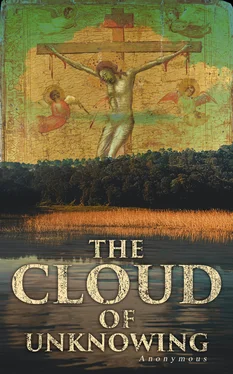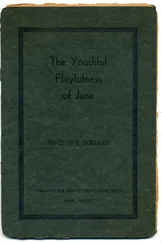True, the will alone, however ardent and industrious, cannot of itself set up communion with the supernal world: this is “the work of only God, specially wrought in what soul that Him liketh.” But man can and must do his part. First, there are the virtues to be acquired: those “ornaments of the Spiritual Marriage” with which no mystic can dispense. Since we can but behold that which we are, his character must be set in order, his mind and heart made beautiful and pure, before he can look on the triple star of Goodness, Truth, and Beauty, which is God. Every great spiritual teacher has spoken in the same sense: of the need for that which Rolle calls the “mending of life”—regeneration, the rebuilding of character—as the preparation of the contemplative act.
For the author of the Cloud all human virtue is comprised in the twin qualities of Humility and Charity. He who has these, has all. Humility, in accordance with the doctrine of Richard of St. Victor, he identifies with self‑knowledge; the terrible vision of the soul as it is, which induces first self‑abasement and then self‑purification—the beginning of all spiritual growth, and the necessary antecedent of all knowledge of God. “Therefore swink and sweat in all that thou canst and mayst, for to get thee a true knowing and a feeling of thyself as thou art; and then I trow that soon after that, thou shalt have a true knowing and a feeling of God as He is.”
As all man’s feeling and thought of himself and his relation to God is comprehended in Humility, so all his feeling and thought of God in Himself is comprehended in Charity; the self-giving love of Divine Perfection “in Himself and for Himself” which Hilton calls “the sovereign and the essential joy.” Together these two virtues should embrace the sum of his responses to the Universe; they should govern his attitude to man as well as his attitude to God. “Charity is nought else . . . but love of God for Himself above all creatures, and of man for God even as thyself.”
Charity and Humility, then, together with the ardent and industrious will, are the necessary possessions of each soul set upon this adventure. Their presence it is which marks out the true from the false mystic: and it would seem, from the detailed, vivid, and often amusing descriptions of the sanctimonious, the hypocritical, the self‑sufficient, and the self‑deceived in their “diverse and wonderful variations,” that such a test was as greatly needed in the “Ages of Faith” as it is at the present day. Sham spirituality flourished in the mediaeval cloister, and offered a constant opportunity of error to those young enthusiasts who were not yet aware that the true freedom of eternity “cometh not with observation.” Affectations of sanctity, pretense to rare mystical experiences, were a favourite means of advertisement. Psychic phenomena, too, seem to have been common: ecstasies, visions, voices, the scent of strange perfumes, the hearing of sweet sounds. For these supposed indications of Divine favour, the author of the Cloud has no more respect than the modern psychologist: and here, of course, he is in agreement with all the greatest writers on mysticism, who are unanimous in their dislike and distrust of all visionary and auditive experience. Such things, he considers, are most often hallucination: and, where they are not, should be regarded as the accidents rather than the substance of the contemplative life—the harsh rind of sense, which covers the sweet nut of “pure ghostliness.” Were we truly spiritual, we should not need them; for our communion with Reality would then be the direct and ineffable intercourse of like with like.
Moreover, these automatism are amongst the most dangerous instruments of self‑deception. “Ofttimes,” he says of those who deliberately seek for revelations, “the devil feigneth quaint sounds in their ears, quaint lights and shining in their eyes, and wonderful smells in their noses: and all is but falsehood.” Hence it often happens to those who give themselves up to such experiences, that “fast after such a false feeling, cometh a false knowing in the Fiend’s school: . . . for I tell thee truly, that the devil hath his contemplatives, as God hath His.” Real spiritual illumination, he thinks, seldom comes by way of these psycho-sensual automatism “into the body by the windows of our wits.” It springs up within the soul in “abundance of ghostly gladness.” With so great an authority it comes, bringing with it such wonder and such love, that “he that feeleth it may not have it suspect.” But all other abnormal experiences—“comforts, sounds and gladness, and sweetness, that come from without suddenly”—should be set aside, as more often resulting in frenzies and feebleness of spirit than in genuine increase of “ghostly strength.”
This healthy and manly view of the mystical life, as a growth towards God, a right employment of the will, rather than a short cut to hidden knowledge or supersensual experience, is one of the strongest characteristics of the writer of the Cloud; and constitutes perhaps his greatest claim on our respect. “Mean only God,” he says again and again; “Press upon Him with longing love”; “A good will is the substance of all perfection.” To those who have this good will, he offers his teaching: pointing out the dangers in their way, the errors of mood and of conduct into which they may fall. They are to set about this spiritual work not only with energy, but with courtesy: not “snatching as it were a greedy greyhound” at spiritual satisfactions, but gently and joyously pressing towards Him Whom Julian of Norwich called “our most courteous Lord.” A glad spirit of dalliance is more becoming to them than the grim determination of the fanatic.
"Shall I, a gnat which dances in Thy ray,
Dare to be reverent.”
Further, he communicates to them certain “ghostly devices” by which they may overcome the inevitable difficulties encountered by beginners in contemplation: the distracting thoughts and memories which torment the self that is struggling to focus all its attention upon the spiritual sphere. The stern repression of such thoughts, however spiritual, he knows to be essential to success: even sin, once it is repented of, must be forgotten in order that Perfect Goodness may be known. The “little word God,” and “the little word Love,” are the only ideas which may dwell in the contemplative’s mind. Anything else splits his attention, and soon proceeds by mental association to lead him further and further from the consideration of that supersensual Reality which he seeks.
The primal need of the purified soul, then, is the power of Concentration. His whole being must be set towards the Object of his craving if he is to attain to it: “Look that nothing live in thy working mind, but a naked intent stretching into God.” Any thought of Him is inadequate, and for that reason defeats its own end—a doctrine, of course, directly traceable to the “Mystical Theology” of Dionysius the Areopagite. “Of God Himself can no man think,” says the writer of the Cloud, “ And therefore I would leave all that thing that I can think, and choose to my love that thing that I cannot think. “The universes which are amenable to the intellect can never satisfy the instincts of the heart.”
Further, there is to be no wilful choosing of method: no fussy activity of the surface‑intelligence. The mystic who seeks the divine Cloud of Unknowing is to be surrendered to the direction of his deeper mind, his transcendental consciousness: that “spark of the soul” which is in touch with eternal realities. “Meddle thou not therewith, as thou wouldest help it, for dread lest thou spill all. Be thou but the tree, and let it be the wright: be thou but the house, and let it be the husbandman dwelling therein.”
Читать дальше









